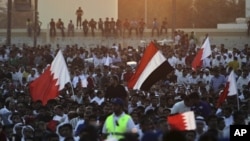Election season is in full swing in a part of the world with muted democracies - the autocratic Arab states of the Persian Gulf. The United Arab Emirates and Bahrain are holding elections on Saturday, selected Saudis will go to the polls next Thursday and citizens in Oman will cast their ballots next month.
Arab Spring and elections
The elections are the first in the region since the beginning of the so-called Arab Spring. In general, civil unrest, or the threat of it, has prompted mild electoral reform in only a few Persian Gulf nations. And in no way do the changes loosen the monarchs’ grip on power.
That is why analysts like Toby Jones, assistant professor of Middle East History at Rutgers University, say the election process is disguised as progress and is aimed more at reinforcing the status quo.
“They are demonstrations on the part of regimes that they understand that there is domestic pressure for political change, but they’re not even half measures, they’re quarter measures and I don’t think anyone takes them very seriously,” said Jones.
Awakening
In no place has the struggle for regional awakening been more visible than in Bahrain. For the past seven months, pro-democracy demonstrators have been calling for the introduction of a constitutional monarchy in the tiny kingdom.
Saturday’s elections will fill 18 seats abandoned by members of the main opposition al-Wefaq party, who quit parliament in February over the government’s bloody crackdown on protesters. Four seats are uncontested. Al-Wefaq and other opposition groups are boycotting the vote.
Mattar Mattar, one of the legislators who resigned, says the decision to replace the parliamentarians is inciting many Bahrainis to take to the streets and protest.
“Of course there is no legitimacy for this parliament because we were representing all seats for the opposition," said Mattar. "So currently the opposition is not represented at all.”
Bahrain
In March, Bahrain’s Gulf neighbors sent military backup to the country to help quell the democratic uprising there and prevent the unrest from spilling over to their shores.
Bahrain’s leaders said the extra troops were needed to reinstate stability. Mattar says the move was unnecessary.
“We don’t think that democracy represents an obstacle and a threat for other GCC countries," said Mattar. "We are trying to send those messages.”
In the region, there are signs by rulers offering some electoral concessions that those messages are having some impact.
United Arab Emirates
In Oman, legislative powers were given to parliament for the first time this year following widespread protests. The largest electoral changes, however, have been offered in the family-ruled United Arab Emirates.
The number of Emiratis allowed to vote in the second-ever Federal National Council elections has increased nearly 20-fold from the first poll in 2006. However, the roughly 129,000 voters were hand picked by the government and only represent about 12 percent of the local population.
And only half of the 40-member FNC is elected. The leaders of the seven emirates that make up the country chose the other half. Ultimately, the body has no lasting law-making power. Like all legislatures in the Gulf, ultimate control rests with the ruling monarchs.
Saudi Arabia
In Saudi Arabia, leaders decided to hold municipal council elections this month after a two-year delay. Many experts say it is likely that the postponement would have dragged on even longer if it were not for the opposition uprisings in neighboring countries.
Saudi candidates will be vying for approximately 1,630 seats on 258 municipal councils. According to the law, only men are allowed to vote and run for office and, as in the UAE, only half of the council seats are elected by the people.
Some analysts see hope that the elections, while restrictive, are at least a needed first boost.
Staci Haag, Gulf regional director for the National Democratic Institute, says the Saudi vote, like other regional polls, is an important stepping-stone to greater democracy.
“The elections are going to be for positions that don’t necessarily hold a lot of power, but once they have the base of public support, a lot of councilors have tended to use that to try and advocate for more power and more say, which moves the ball forward a little bit every time,” said Haag.
Democracy
Haag says that the transition to democracy is likely to move at a much slower pace in the Gulf than in other areas of the Middle East, but adds that historically, once a nation is given a taste of political participation there is usually no going back.
“I don’t know how long it’s going to take and I don’t know what form it’s going to take, but I do think that there is an awakening, especially on the part of young people and on the part of women,” said Haag.
For their part, Gulf leaders say they are committed to democratic reform but insist it must be introduced gradually so as not to destroy the fabric of society after generations of absolute rule.




